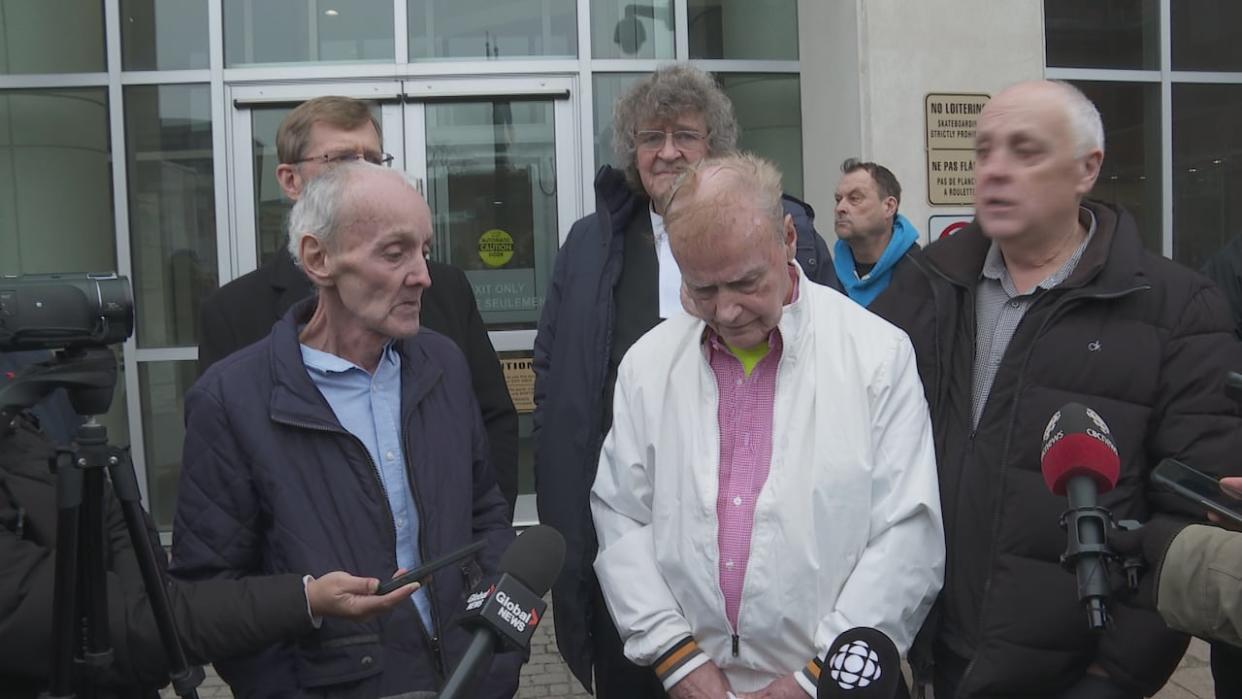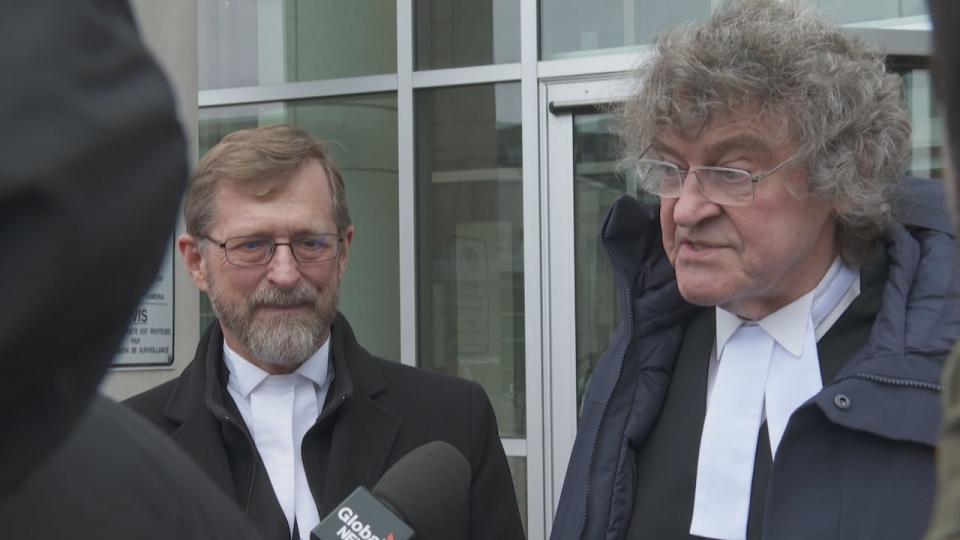Saint John men acquitted of murder almost 40 years after wrongful conviction

Vindication has come for two Saint John men who maintained for 40 years that they were wrongly convicted of murdering another man.
Robert Mailman and Walter Gillespie walked out of the Saint John courthouse on Thursday as innocent men after Court of King's Bench Chief Justice Tracey DeWare ruled they were not guilty of the 1983 murder of George Leeman.
"I feel good," was Gillespie's response outside the courthouse when asked how he felt.
Mailman, who is thin and has been weakened by terminal cancer, declined to speak on Thursday but Ron Dalton, co-president of Innocence Canada who took up their case, spoke to reporters on his behalf.
"They've been 40 years waiting for this. As you can imagine, they're glad this day has finally come," said Dalton, who has also been exonerated for a murder he didn't commit.
"[Robert] wants to express his appreciation to his best buddy, Wally, who stayed solid for 40 years when he could have walked away any time and just pointed the finger at him."
Both maintained innocence
Gillespie and Mailman were originally convicted of murdering Leeman in May 1984 and were sentenced to life in prison, with no chance of parole, for 18 years.
The two always maintained their innocence.
Following unsuccessful appeals and efforts to get their case reviewed, federal Justice Minister Arif Virani announced last month he was overturning the convictions and granting Mailman and Gillespie new trials. Virani said new information led him to believe "a miscarriage of justice likely occurred."
Thursday was the first court appearance for Mailman, 76, and Gillespie, 80.
At the outset of the hearing, DeWare read out the charges the two faced in connection to the murder of Leeman and asked them how they planned to plead.
"Not guilty," said Mailman, in a frail voice, followed by Gillespie, who echoed the same but in a heavier tone.
Crown prosecutor Karen Lee then informed the court she had no evidence to present.
Given that, DeWare said she had no choice but to find them not guilty of the murder charges they originally faced 40 years ago.
"Mr. Mailman and Mr. Gillespie entered this courtroom today innocent in the eyes of the law as a result of Minister Virani's order," DeWare said. "They may leave the court today with that presumption of innocence maintained and forever confirmed by the fact they have been found not guilty of this charge."
"It is most regretful it has taken 40 years for this day to come."
Case against them 'a disgrace', says lawyer
Innocence Canada, an organization that advocates for and represents those wrongfully convicted, took on the men's case in 2018 and filed the request for a review by the Department of Justice.
Organization lawyers James Lockyer and Jerome Kennedy appeared in court Thursday, and they described problems with the case against Mailman and Gillespie.

Innocence Canada lawyers Jerome Kennedy and James Lockyer represented Mailman and Gillespie and described the issues with the criminal case originally brought against the two men. (Graham Thompson/CBC)
They said those problems included failures by either the Saint John Police Force or Crown prosecutors to disclose all the information they had available to them ahead of the two men's trial.
"If full disclosure would be made at their trial, it would have been abundantly obvious that the only two Crown witnesses who said anything to implicate either of these men in the murder was not just unreliable, but false," Lockyer said.
The witnesses, who testified to having seen Mailman and Gillespie commit the murder, later recanted their testimony, saying they lied while on the stand.
Meanwhile, new information not uncovered in the original investigation helped prove the alibi that placed Mailman and Gillespie away from the scene of the crime.
"The Saint John police have a lot to answer for in my view," Lockyer said. "This case was a disgrace."
In a news release issued after DeWare's ruling, the Saint John Police Force said in order to better understand Virani's determination that a miscarriage of justice likely occurred, it will be seeking the final results of the Department of Justice's review of the case, and the rationale that led to Thursday's outcome.
"While we respect the judicial process, we are deeply concerned with the impact it may have on all parties involved," the police force said in its statement.
"We remain dedicated to upholding the highest standards of justice and will continue to work diligently to do so."
What comes next
Lockyer said the issues in this case mirror those of Erin Walsh, another man who was wrongfully convicted of murder in Saint John and later exonerated with help from Innocence Canada.
Lockyer said the next best steps would be to hold a public inquiry, or for his team to be allowed to work with New Brunswick's attorney general to identify other similar cases.
"Because I've no doubt they're out there," he said.
As for any compensation for the two men, Kennedy said it's too soon to say what might happen.
"Today is just an opportunity for Wally and Bobby, especially having regard to Bobby's health, that he can finally say, 'I told everyone I was innocent. No one listened and yet today here I am,'" Kennedy said.
While Mailman got out of prison after 18 years and Gillespie after 21, both men had been on parole, subject to strict conditions that could send them back to prison if broken.
Dalton said Mailman was diagnosed in November with terminal cancer and at the time given about three months to live.


